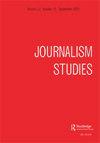Survival in the Fissure: Strategies of Private News Organizations in the Social Media Era in China
IF 2.9
1区 文学
Q1 COMMUNICATION
引用次数: 0
Abstract
The rise of social media has spawned private news organizations in China that are encountering problems regarding how to gain public and journalistic acceptance and recognition as newcomers and how to survive without a news license. Drawing on organizational legitimacy theory, this paper investigates the strategies employed by private news organizations to construct multiple layers of legitimacy including regulatory, normative and cognitive legitimacy in China's unique context and the social media era. Based on in-depth interviews with 20 practitioners of private news organizations and participant observation in one private news agency, findings showed that private news organizations (1) gain regulatory legitimacy through news production methods including “misplacing registration”, “playing with official hats” and “depoliticization”; (2) establish normative legitimacy by emphasizing their adherence to traditional journalistic values, norms, and routines, and their similarities to state-owned media; (3) obtain cognitive legitimacy through the creation of “hot news” with reliance on professional reputation. This study thereby explores these strategies to reflect the path of “dependent autonomy” of private news organizations and provides an institutional and organizational perspective to understand the constraints and characteristics of social media journalism in China.裂隙中的生存:社交媒体时代中国民营新闻机构的策略
社交媒体的兴起催生了中国的民营新闻机构,它们作为新来者如何获得公众和新闻界的接受和认可,以及如何在没有新闻执照的情况下生存,这些都是它们面临的问题。本文以组织合法性理论为基础,考察了民营新闻机构在中国独特语境和社交媒体时代下构建监管合法性、规范合法性和认知合法性等多层合法性的策略。基于对20名民营新闻机构从业人员的深度访谈和对一家民营新闻机构的参与者观察,研究发现:(1)民营新闻机构通过“误配注册”、“玩弄官帽”和“去政治化”等新闻生产方式获得监管合法性;(2)通过强调他们对传统新闻价值观、规范和惯例的坚持,以及他们与国有媒体的相似之处,建立规范的合法性;(3)依靠职业声誉,通过制造“热点新闻”获得认知合法性。因此,本研究探讨了这些策略,以反映民营新闻机构的“依赖自主”路径,并提供了一个制度和组织的视角来理解中国社交媒体新闻的约束和特征。
本文章由计算机程序翻译,如有差异,请以英文原文为准。
求助全文
约1分钟内获得全文
求助全文

 求助内容:
求助内容: 应助结果提醒方式:
应助结果提醒方式:


